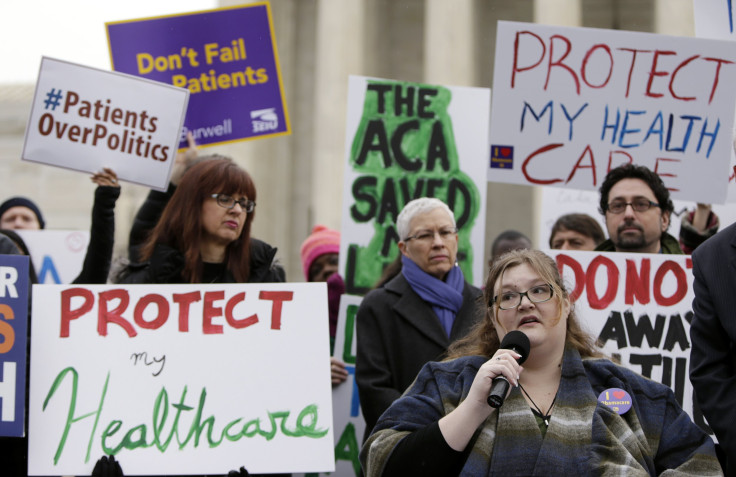Supreme Court Obamacare Subsidies Ruling: Public Largely Uninformed About King V. Burwell Case That Could Affect Millions Of Americans

An upcoming ruling by the Supreme Court could make health insurance unaffordable for millions of Americans, yet few are aware of that fact, a survey by the Kaiser Family Foundation published Tuesday showed. A whopping 44 percent of those polled said they had heard “nothing at all” about the case of King v. Burwell, the most recent major legal challenge to the Affordable Care Act that could put an end to subsidies that reduce the cost of health insurance for middle-class Americans in 34 states.
Twenty-eight percent of respondents in the June edition of the monthly Kaiser Health Tracking Poll said they had heard “a little” about the case, 14 percent had heard “something,” and 13 percent had heard “a lot.” The December version of Kaiser’s poll found by comparison that 55 percent of respondents had heard “nothing at all” about the case, 29 percent had heard a little, 11 percent some, and just 4 percent "a lot." The Supreme Court heard oral arguments for the case in early March and is expected to issue a decision by the end of June.
Should the court rule in favor of the plaintiffs in a way that strikes down subsidies to people living in states relying on the federal marketplace, Congress ought to pass a law allowing residents of all states to receive subsidies, regardless of whether states created their own health exchanges or use the federal one, roughly six of 10 of the poll respondents said. About a quarter of those polled said Congress should do nothing in the event of such a ruling.
Public opinion on the Affordable Care Act overall remains as divided as ever, the survey found. Forty-two percent of those polled viewed the law unfavorably, while 39 percent viewed it favorably, and those findings fell along party lines, where Democrats tended to favor the law and Republicans not so much. A majority of respondents who identified as Democrats said Congress should pass a law allowing residents of all states to receive subsidies, whereas just under half of those who considered themselves Republicans said Congress should not.
Where news on health insurance coverage failed to captivate the public, other topics were far more successful in holding its attention. More than two-thirds of those polled said they followed stories about the Islamic State militant group, along with other Islamic militant groups in the Syria and Iraq conflicts “very” or “fairly closely. Public attention also focused on the Baltimore police officers who were indicted in the death of an unarmed of black man, Freddie Gray, with roughly the same proportion tracking developments in that story, the survey found.
The same survey also asked respondents for their opinions on prescription drug prices and found that 73 percent considered them too high, regardless of whether they were taking such drugs themselves. A similar proportion, roughly seven out of 10, said that insurance companies ought to cover the cost of expensive prescription drugs if cheaper alternatives were unavailable -- even if that pushed monthly insurance rates up.
The poll surveyed 1,200 adults in the United States from June 2 through June 9 and had a margin of error of plus or minus 3 percent.
© Copyright IBTimes 2024. All rights reserved.






















